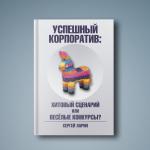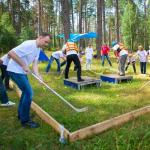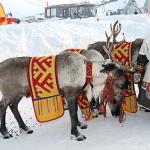49.03 01 physical culture. Physical culture - bachelor's degree (49.03.01)
Undergraduate
49.03.01
«
PHYSICAL CULTURE"
Full-time education (normative period 4 years)575 budget places
Correspondence form of education (normative period 5 years)182 budget places) General competition for all directions (profiles)
Graduate degree (qualification) –bachelor
In the diploma of the graduate in the qualification column, an entry will be made - bachelor in the field of study 49.03.01 " Physical Culture”, and in the appendix to the diploma the focus (profile) of the educational program will be indicated.
Entrance tests:
1) Russian language (USE)
2) biology (USE)
3) chosen sport: +
Orientations (profiles) educational programs:
1. Sports training in the chosen sport
Recruiting departments:
Department of Theory and Methods of Cycling (cycling)
Department of Theory and Methods of Water-motor and Sailing Sports (Automotive Sports, Sailing Sports)
Department of Theory and Methods of Gymnastics (artistic gymnastics, gymnastics, aesthetic gymnastics, sports aerobics, sports acrobatics, acrobatic rock and roll, dance sports)
Department of Theory and Methods of Rowing Sports (academic rowing, coastal rowing, kayaking, canoeing, rowing slalom)
Department of Theory and Methods of Athletics (Athletics)
Department of Theory and Methods of Swimming (swimming)
Department of Theory and Methods of Sports Games (basketball, volleyball, handball, tennis, table tennis)
Department of Theory and Methods of Football (football)
(speed skating, figure skating)
(alpine skiing, cross-country skiing, Nordic combined, ski jumping, snowboarding, freestyle)
(hockey)
(biathlon)
(curling, climbing)
Faculty of martial arts and non-Olympic sports
(weightlifting, kettlebell lifting, bodybuilding, powerlifting)
(boxing, kickboxing, taekwondo)
(freestyle wrestling, Greco-Roman wrestling, judo, sambo)
(fencing)
(orienteering, sports tourism, rugby, billiards, darts, city sports, drafts sports, chess sports)
2. Physical culture and health work
Recruiting departments:
(polyathlon)
Department of Theory and Methods of Swimming (Water Sports)
Department of Theory and Methods of Gymnastics (gymnastic sports)
3. Sports management
Recruiting departments:
Institute of Economics and Social Technologies
(sport of choice 1)
4. Anti-doping support in sports
Recruiting departments:
Faculty of Health and Rehabilitology
(sport of choice 1)
5. Sports facilities and industry
Recruiting departments:
Faculty of Winter Olympic Sports
(sport of choice 1)
1 Note: The applicant chooses from the list of sports and reports his choice when submitting an application to the admissions officer.
Approved
order of the Ministry of Education
and science Russian Federation
1.1. Present federal state educational standard higher education(hereinafter - FSES HE) is a set of mandatory requirements for the implementation of basic professional educational programs of higher education - undergraduate programs in the field of study 49.03.01 Physical Education (hereinafter, respectively - the bachelor's program, field of study).
1.2. Education in the undergraduate program is only allowed in educational organization higher education (hereinafter - Organization).
1.3. Education under the undergraduate program in the Organization can be carried out in full-time, part-time and part-time forms.
1.4. The content of higher education in the field of study is determined by the undergraduate program developed and approved by the Organization independently. When developing a bachelor's program, the Organization forms requirements for the results of its development in the form of universal, general professional and professional competencies graduates (hereinafter together - competencies).
The organization develops a bachelor's program in accordance with the Federal State Educational Standard of Higher Education, taking into account the corresponding exemplary basic educational program included in the register of exemplary basic educational programs (hereinafter referred to as POEP).
1.5. When implementing the undergraduate program, the Organization has the right to use e-learning, distance learning technologies.
E-learning, distance learning technologies used in the training of disabled people and persons with disabilities (hereinafter referred to as the disabled and persons with disabilities) should provide for the possibility of receiving and transmitting information in forms accessible to them.
1.6. The implementation of the undergraduate program is carried out by the Organization both independently and through a network form.
1.7. The undergraduate program is implemented in the state language of the Russian Federation, unless otherwise specified by the local normative act Organizations.
1.8. The term for obtaining education under the bachelor's program (regardless of the educational technologies used):
in full-time education, including vacations provided after passing the state final certification, is 4 years;
in part-time or part-time education increases by at least 6 months and not more than 1 year compared to the period of education in full-time education;
when studying according to an individual curriculum for disabled people and persons with disabilities, it can be increased at their request by no more than 1 year compared to the period of education established for the corresponding form of education.
1.9. The volume of the bachelor's program is 240 credit units (hereinafter - credits), regardless of the form of study, the educational technologies used, the implementation of the bachelor's program using the network form, the implementation of the bachelor's program according to the individual curriculum.
The volume of the undergraduate program implemented in one academic year, is not more than 70 z.u. regardless of the form of study, the educational technologies used, the implementation of the bachelor's program using the network form, the implementation of the bachelor's program according to an individual curriculum (with the exception of accelerated learning), and with accelerated learning - no more than 80 z.u.
1.10. The organization independently determines within the terms and volumes established by paragraphs 1.8 and 1.9 of the Federal State Educational Standard of HE:
the term for obtaining education under the bachelor's program in part-time or part-time forms of study, as well as according to an individual curriculum, including with accelerated learning;
the volume of the undergraduate program implemented in one academic year.
1.11. Areas professional activity and areas of professional activity in which graduates who have mastered the undergraduate program (hereinafter referred to as graduates) can carry out professional activities:
01 Education and science (in the field of primary general, basic general, secondary general education, vocational training, vocational education, additional education, in the field of scientific research);
05 Physical culture and sports (in the field of physical education, in the field of physical culture and mass sports, sports training, in the field of managing the activities and development of a sports organization).
Graduates can carry out professional activities in other areas of professional activity and (or) areas of professional activity, provided that the level of their education and the acquired competencies meet the requirements for the qualification of an employee.
1.12. Within the framework of mastering the undergraduate program, graduates can prepare for solving the following types of professional tasks:
coaching;
pedagogical;
recreational;
organizational and methodological;
organizational and managerial;
research.
1.13. When developing a bachelor's program, the Organization establishes the direction (profile) of the bachelor's program, which corresponds to the direction of training in general or specifies the content of the bachelor's program within the framework of the direction of training by focusing it on:
area(s) of professional activity and area(s) of professional activity of graduates;
type (types) of tasks and tasks of professional activity of graduates;
if necessary - to the objects of professional activity of graduates or area (areas) of knowledge.
1.14. A bachelor's program containing information constituting a state secret is developed and implemented in compliance with the requirements stipulated by the legislation of the Russian Federation and other regulatory legal acts in the field of protecting state secrets.
2.1. The structure of the undergraduate program includes the following blocks:
Block 1 "Disciplines (modules)";
Block 2 "Practice";
Block 3 "State final certification".
|
The structure of the undergraduate program |
The volume of the undergraduate program and its blocks in z.u. |
|
|
Disciplines (modules) |
at least 180 |
|
|
Practice |
at least 30 |
|
|
State final certification | ||
|
Scope of the undergraduate program | ||
2.2. The undergraduate program should ensure the implementation of disciplines (modules) in philosophy, history (history of Russia, general history), foreign language, life safety within the framework of Block 1 "Disciplines (modules)".
2.3. The undergraduate program should ensure the implementation of disciplines (modules) in physical culture and sports:
in the amount of at least 2 credits. within the framework of Block 1 "Disciplines (modules)";
in the amount of at least 328 academic hours, which are mandatory for mastering, are not converted into s.u. and are not included in the volume of the undergraduate program, within the framework of elective disciplines (modules) in full-time education.
Disciplines (modules) in physical culture and sports are implemented in the order established by the Organization. For people with disabilities and persons with disabilities, the Organization establishes a special procedure for mastering disciplines (modules) in physical culture and sports, taking into account their state of health.
2.4. Block 2 "Practice" includes educational and industrial practices (hereinafter together - practices).
Types educational practice:
introductory practice;
coaching practice;
teaching practice;
organizational practice.
Types of work experience:
coaching practice;
teaching practice;
organizational practice;
professionally oriented practice;
undergraduate practice.
2.6. Organization:
selects one or more types of educational practice and one or more types of work practice from the list specified in paragraph 2.4 of the Federal State Educational Standard of HE;
has the right to establish an additional type (types) of educational and (or) production practices;
establishes the scope of practices of each type.
2.7. Block 3 "State final certification" includes:
preparation for passing and passing the state exam (if the Organization has included the state exam in the state final certification);
preparation for the defense procedure and defense of the final qualifying work.
2.8. When developing a bachelor's program, students are provided with the opportunity to master elective disciplines (modules) and optional disciplines (modules).
Optional disciplines (modules) are not included in the volume of the undergraduate program.
2.9. Within the framework of the undergraduate program, a mandatory part and a part formed by participants in educational relations are distinguished.
The mandatory part of the undergraduate program includes disciplines (modules) and practices that ensure the formation of general professional competencies, as well as professional competencies established by the POOP as mandatory (if any).
The compulsory part of the undergraduate program includes, among other things:
disciplines (modules) specified in clause 2.2 of the Federal State Educational Standard of Higher Education;
disciplines (modules) in physical culture and sports, implemented within the framework of Block 1 "Disciplines (modules)".
Disciplines (modules) and practices that ensure the formation of universal competencies can be included in the mandatory part of the undergraduate program and in the part formed by participants in educational relations.
The volume of the compulsory part, excluding the volume of the state final certification, must be at least 60 percent of the total volume of the undergraduate program.
2.10. The organization should provide disabled people and persons with disabilities (at their request) with the opportunity to study under the bachelor's program, taking into account the peculiarities of their psychophysical development, individual capabilities and, if necessary, ensuring the correction of developmental disorders and social adaptation of these persons.
3.1. As a result of mastering the bachelor's program, the graduate should have formed the competencies established by the bachelor's program.
3.2. The undergraduate program should establish the following universal competencies:
|
Code and name of the graduate's universal competence |
|
|
Systems and critical thinking |
UK-1. Able to search, critical analysis and synthesis of information, apply systems approach to solve the tasks |
|
Development and implementation of projects |
UK-2. Able to determine the range of tasks within the framework of the goal and choose the best ways to solve them, based on existing legal regulations, available resources and constraints |
|
Teamwork and Leadership |
UK-3. Capable of social interaction and fulfill your role in the team |
|
Communication |
UK-4. Able to carry out business communication in oral and written forms in the state language of the Russian Federation and foreign language(s) |
|
Intercultural interaction |
UK-5. Able to perceive the intercultural diversity of society in the socio-historical, ethical and philosophical contexts |
|
Self-organization and self-development (including health protection) |
UK-6. Able to manage his time, build and implement the trajectory of self-development based on the principles of education throughout life |
|
UK-7. Able to maintain the proper level of physical fitness to ensure full-fledged social and professional activities |
|
|
Life safety |
UK-8. Able to create and maintain safe living conditions, including in case of emergencies |
3.3. The undergraduate program should establish the following general professional competencies:
|
Code and name of the general professional competence of the graduate |
|
|
Planning |
OPK-1. Able to plan the content of classes, taking into account the provisions of the theory of physical culture, the physiological characteristics of the load, anatomical, morphological and psychological features involved in different genders and ages |
|
Sports Selection |
OPK-2. Able to carry out sports selection and sports orientation in the process of training |
|
Education and development |
OPK-3. Able to conduct classes and physical culture and sports events using the means, methods and techniques of the basic types of physical culture and sports activities for motor and cognitive learning and physical training |
|
OPK-4. Able to conduct training sessions of various directions and organize the participation of athletes in competitions in the chosen sport |
|
|
Upbringing |
OPK-5. Able to educate those involved in socially significant personal qualities to prevent negative social behavior |
|
OPK-6. Able to form a conscious attitude of those involved in physical culture and sports activities, motivational-value orientations and attitudes towards leading healthy lifestyle life |
|
|
Security |
OPK-7. Able to ensure compliance with safety regulations, injury prevention, provide first aid |
|
Doping Prevention |
OPK-8. Capable of doing doping prevention work |
|
Control and analysis |
OPK-9. Able to exercise control using methods for measuring and evaluating physical development, technical and physical fitness, and the mental state of those involved |
|
Professional interaction |
OPK-10. able to organize joint activities and interaction of participants in activities in the field of physical culture and sports |
|
Scientific research |
OPK-11. Able to conduct research to determine the effectiveness of the means and methods of physical culture and sports activities used |
|
Legal basis of professional activity |
OPK-12. Able to carry out professional activities in accordance with the regulatory legal acts of the field of physical culture and sports and the norms of professional ethics |
|
Organizational and methodological support |
GPC-13. Able to organize and referee competitions in the chosen sport |
|
OPK-14. Able to carry out methodological support and control of training and educational process |
|
|
Logistics |
OPK-15. Able to carry out the material and technical equipment of classes, competitions, sports events |
3.4. The professional competencies established by the undergraduate program are formed on the basis of professional standards corresponding to the professional activities of graduates (if any), and also, if necessary, based on an analysis of the requirements for professional competencies for graduates in the labor market, generalization of domestic and foreign experience, holding consultations with leading employers, associations of employers in the industry in which graduates are in demand, other sources (hereinafter referred to as other requirements for graduates).
3.5. When determining the professional competencies established by the undergraduate program, the Organization:
includes all required professional competencies (if any) in the undergraduate program;
includes one or more professional competencies independently determined, based on the direction (profile) of the undergraduate program, on the basis of professional standards corresponding to the professional activities of graduates (if any), and also, if necessary, on the basis of an analysis of other requirements for graduates (the Organization has the right do not include self-determined professional competencies in the presence of mandatory professional competencies, as well as in the case of inclusion of recommended professional competencies in the undergraduate program).
When determining professional competencies based on professional standards, the Organization selects professional standards that correspond to the professional activities of graduates, from among those specified in the annex to the Federal State Educational Standard of Higher Education and (or) other professional standards that correspond to the professional activities of graduates, from the register of professional standards (list of types of professional activities) posted on the specialized website of the Ministry of Labor and Social Protection of the Russian Federation "Professional standards" (http://profstandart.rosmintrud.ru) (if there are relevant professional standards).
From each selected occupational standard, the Organization identifies one or more generalized labor functions(hereinafter - OTF), corresponding to the professional activity of graduates, on the basis of the qualification level established by the professional standard for the OTF and the requirements of the section "Requirements for education and training". HTF can be allocated in whole or in part.
3.6. The totality of competencies established by the undergraduate program should provide the graduate with the ability to carry out professional activities in at least one area of professional activity and the field of professional activity established in accordance with clause 1.11 of the Federal State Educational Standard of Higher Education, and to solve problems of professional activity of at least one type established in in accordance with paragraph 1.12 of the Federal State Educational Standard.
3.7. The organization establishes indicators for the achievement of competencies in the undergraduate program:
universal, general professional and, if available, mandatory professional competencies - in accordance with the indicators of achievement of competencies established by the PEP;
3.8. The organization independently plans the learning outcomes in disciplines (modules) and practices, which must be correlated with the indicators of achievement of competencies established in the undergraduate program.
The set of planned learning outcomes in disciplines (modules) and practices should ensure the formation of all the competencies established by the bachelor's program in the graduate.
4.1. Requirements for the conditions for the implementation of the undergraduate program include system-wide requirements, requirements for material, technical and educational and methodological support, requirements for personnel and financial conditions implementation of the undergraduate program, as well as the requirements for the applied quality assessment mechanisms educational activities and preparation of students in the undergraduate program.
4.2.1. The organization must own or otherwise legal basis material and technical support of educational activities (premises and equipment) for the implementation of the undergraduate program in Block 1 "Disciplines (modules)" and Block 3 "State Final Attestation" in accordance with the curriculum.
4.2.2. Each student during the entire period of study must be provided with individual unlimited access to the electronic information and educational environment of the Organization from any point where there is access to the information and telecommunication network "Internet" (hereinafter referred to as the "Internet"), both on the territory of the Organization, as well as outside of it. The conditions for the functioning of the electronic information and educational environment can be created using the resources of other organizations.
The electronic information and educational environment of the Organization should provide:
Access to curricula, work programs of disciplines (modules), practices, electronic educational publications and electronic educational resources specified in the work programs of disciplines (modules), practices;
the formation of an electronic portfolio of the student, including the preservation of his works and marks for these works.
In the case of implementing a bachelor's program using e-learning, distance learning technologies, the electronic information and educational environment of the Organization should additionally provide:
fixing the course of the educational process, the results of intermediate certification and the results of mastering the undergraduate program;
conducting training sessions, procedures for assessing learning outcomes, the implementation of which is provided for using e-learning, distance learning technologies;
interaction between participants in the educational process, including synchronous and (or) asynchronous interaction via the Internet.
The functioning of the electronic information and educational environment is ensured by appropriate means of information and communication technologies and the qualifications of employees using and supporting it. The functioning of the electronic information and educational environment must comply with the legislation of the Russian Federation.
4.2.3. When implementing a bachelor's program in a network form, the requirements for the implementation of a bachelor's program must be provided by a set of resources for material, technical and educational support provided by organizations participating in the implementation of a bachelor's program in a network form.
4.3.1. The premises should be classrooms for conducting training sessions provided for by the undergraduate program, equipped with equipment and technical means training, the composition of which is determined in the work programs of disciplines (modules).
Premises for independent work of students should be equipped computer technology with the ability to connect to the Internet and provide access to the electronic information and educational environment of the Organization.
It is allowed to replace the equipment with its virtual analogues.
4.3.2. The organization must be provided with the necessary set of licensed and freely distributed software, including domestic production (the composition is determined in the work programs of disciplines (modules) and is subject to updating if necessary).
4.3.3. When using printed publications in the educational process, the library fund must be completed with printed publications at the rate of at least 0.25 copies of each of the publications indicated in the work programs of disciplines (modules), practices, per one student from among persons simultaneously mastering the relevant discipline (module ) undergoing relevant practice.
4.3.4. Students should be provided with access (remote access), including in the case of using e-learning, distance learning technologies, to modern professional bases data and information reference systems, the composition of which is determined in the work programs of disciplines (modules) and is subject to updating (if necessary).
4.3.5. Students from among the disabled and persons with disabilities should be provided with printed and (or) electronic educational resources in forms adapted to the limitations of their health.
4.4.1. The implementation of the undergraduate program is provided by the teaching staff of the Organization, as well as persons involved by the Organization in the implementation of the undergraduate program on other terms.
4.4.2. Qualification teaching staff Organizations must respond qualification requirements specified in qualification guides and/or professional standards (if any).
4.4.3. At least 70 percent of the number of teaching staff of the Organization participating in the implementation of the bachelor's program, and persons involved by the Organization in the implementation of the bachelor's program on other conditions (based on the number of positions to be replaced, reduced to integer values), must conduct scientific, educational and methodological and (or ) practical work corresponding to the profile of the taught discipline (module).
4.4.4. At least 5 percent of the number of teaching staff of the Organization participating in the implementation of the bachelor's program, and persons involved by the Organization in the implementation of the bachelor's program on other conditions (based on the number of positions to be replaced, reduced to integer values), must be managers and (or) employees of other organizations implementing labor activity in professional field corresponding to the professional activity for which graduates are preparing (to have at least 3 years of work experience in this professional field).
4.4.5. At least 60 percent of the number of teaching staff of the Organization and persons involved in the educational activities of the Organization on other conditions (based on the number of replacement positions reduced to integer values) must have an academic degree (including a scientific degree obtained in a foreign country and recognized in Russian Federation) and (or) an academic title (including an academic title obtained in a foreign state and recognized in the Russian Federation).
Persons without degrees and titles having sports titles "Master of Sports of Russia", "Master of Sports of the USSR", "Grandmaster of Russia", "Grandmaster of the USSR", "Master of Sports of Russia of international class", "Master of Sports of the USSR of international class", honorary sports titles "Honored Master of Sports of Russia", "Honored Master of Sports of the USSR", "Honored Coach of Russia", "Honored Coach of the USSR", "Honorary Sports Judge of Russia", honorary titles "Honored Worker of Physical Culture and Sports of the Russian Federation", "Honored Worker of Physical Culture and Sports RSFSR", as well as being laureates of state awards in the field of physical culture and sports.
4.5.1. Financial support implementation of the undergraduate program should be carried out in an amount not lower than the values of the basic standards for the cost of providing public services for the implementation of educational programs of higher education - bachelor's programs and the values of adjustment factors to the basic cost standards determined by the Ministry of Education and Science of the Russian Federation.
4.6.1. The quality of educational activities and training of students in the undergraduate program is determined within the framework of the internal evaluation system, as well as the external evaluation system, in which the Organization participates on a voluntary basis.
4.6.2. In order to improve the undergraduate program, the Organization, when conducting a regular internal assessment of the quality of educational activities and training students in the undergraduate program, involves employers and (or) their associations, other legal and (or) individuals, including the teaching staff of the Organization.
As part of internal system assessing the quality of educational activities in the undergraduate program, students are given the opportunity to assess the conditions, content, organization and quality of the educational process as a whole and individual disciplines (modules) and practices.
4.6.3. An external assessment of the quality of educational activities under the bachelor's program as part of the state accreditation procedure is carried out in order to confirm the compliance of educational activities under the bachelor's program with the requirements of the Federal State Educational Standard of Higher Education, taking into account the relevant PEP.
4.6.4. External assessment of the quality of educational activities and training of students in the undergraduate program can be carried out within the framework of professional and public accreditation conducted by employers, their associations, as well as organizations authorized by them, including foreign organizations, or authorized national professional and public organizations that are part of international structures , in order to recognize the quality and level of training of graduates that meet the requirements of professional standards (if any), the requirements of the labor market for specialists of the relevant profile.
Application
to the federal government
educational standard of higher
education - bachelor's degree in the direction
training 49.03.01 Physical
culture approved by order
Ministry of Education and Science
Professional standard "Teacher (pedagogical activity in the field of preschool, primary general, basic general, secondary general education) (educator, teacher)", approved by order of the Ministry of Labor and Social Protection of the Russian Federation of October 18, 2013 N 544n (registered by the Ministry of Justice of the Russian Federation on December 6, 2013, registration N 30550), as amended by orders of the Ministry of Labor and Social Protection of the Russian Federation of December 25, 2014 N 1115n (registered by the Ministry of Justice of the Russian Federation on February 19, 2015, registration N 36091) and from August 5, 2016 N 422н (registered by the Ministry of Justice of the Russian Federation on August 23, 2016, registration N 43326)
Professional standard "Teacher of additional education for children and adults", approved by order of the Ministry of Labor and Social Protection of the Russian Federation of September 8, 2015 N 613n (registered by the Ministry of Justice of the Russian Federation on September 24, 2015, registration N 38994)
Professional standard "Instructor-methodist", approved by order of the Ministry of Labor and Social Protection of the Russian Federation of September 8, 2014 N 630n (registered by the Ministry of Justice of the Russian Federation on September 26, 2014, registration N 34135), as amended by order of the Ministry of Labor and social protection of the Russian Federation dated December 12, 2016 N 727n (registered by the Ministry of Justice of the Russian Federation on January 13, 2017, registration N 45230)
Professional standard "Sports referee", approved by order of the Ministry of Labor and Social Protection of the Russian Federation of October 23, 2015 N 769n (registered by the Ministry of Justice of the Russian Federation on November 18, 2015, registration N 39741)
Description
All disciplines in this profile are divided into two blocks: general education and methodological. Within the framework of the first block, students get acquainted with the following subjects: human anatomy, biomechanics of motor activity, psychology of physical culture, human biochemistry and others. Within the framework of the second block, the following disciplines are studied: methodology and theory of education in the main sports (gymnastics, skiing, athletics and others), pedagogy of physical culture, methodology and theory in the chosen sport. Sports training is also an integral part of training.
Whom to work
Graduates can find work in children's sections, in fitness clubs, in the Olympic movement or in professional sports. After graduation, you can also find a job in various educational establishments(to schools or kindergartens, orphanages), to medical, correctional or rehabilitation centers. Opportunity to work in institutions additional education: in sports clubs, swimming pools, sports centers. They can practice coaching, preparing athletes for performance in competitions of different levels or teaching beginners the basics of different types sports.






